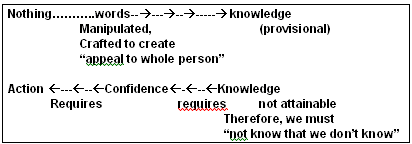Week 4--True/False Rhetoric
This week (as well as last week) we looked at True and False Rhetoric. What is it, according to Plato and Isocrates, and how have you seen it in your program? Do not disclose anything that might get you into trouble. But, what is the value of true and false rhetoric in our programs?According to Plato, false rhetoric includes persuasion and belief. Through the use of false rhetoric someone may be persuaded to believe that something is good for them when in fact it is not or when it convinces someone to do something which will only benefit the speaker. True rhetoric is intended for the benefit of those practicing it as well as those being practiced upon.
These ideas are directly applicable to my current position as team member for a system wide implementation of the lms WebCT Vista. This is something which we have been considering. We recently had a teleconference in which members of the meeting were discussing the implementation and the goals administrators had for the implementation such as increased collaboration between colleges and more efficient use of resources. After about 45 minutes of conversation, one person reminded the group that the primary goal of the lms was to benefit the student and that we needed to keep that goal at the center of our discussions.
My concern is that True Rhetoric will not make everyone work like one happy family. It would be nice but realistically that is not the case. I think about faculty who will be faced with Vista implementation in the next year and the many personalities which the implementation team will have to work with. According to True Rhetoric I should be able to convince faculty that everyone will benefit, the students, the faculty member and the institution and they will want to use the lms because of the benefits. What many will argue is that this only brings the faculty more work. For those who have many years to teach, I would argue that this new knowledge will make them more effective teachers and more competitive in the field. But for faculty members who are close to retirement this argument will not work. They will not be convinced that the investment of time and energy is worth it for them (even if it benefits the students) and they may not be convinced that the technology will make them considerably (or even a little) more effective.
True Rhetoric would work only if everyone had the same priorities and if they were willing to do what is "right" which many would argue is still a matter of opinion.
Week 3--Plato
List out as many things about Plato that you know. What does he suggest about finding the Truth, about oral persuasion, about writing, about the value of rhetoric? Also, as we agreed from Week-1, please point out the progress you're making on your final project in each blog post. Thanks.Plato suggests that it is possible to find transcendent absolute truth through discourse. Plato argues that a rhetor can use rhetoric to convey truth to an ignorant audience by any means as long as the rhetor is virtuous and is seeking the audience's self-improvement. This can also be done in a more methodological format with a "give-and-take" between two individuals, the more knowledgable one correcting the inexperienced thinker by demonstrating the logic he uses to arrive at the truth. Plato is interested in finding the one characteristic which is shared by many examples which cannot be achieved through the senses but through the mind. The absolute/forms are real but cannot be seen.
I haven't made a final decision about my paper yet. I'm thinking about working on online course instruction and how the idea of either kairos or pathos can be applied to it.
Week 2--Gorgias
What does Gorgias emphasize? Why is this significant to both classical rhetoric and contemporary teaching? And finally, what are you thinking about for your 20-page paper/project thus far?Gorgias emphasizes that knowledge is "provisional" and that Truth does not exist or that knowledge of Truth is not attainable. In order for us to believe anything, we need to "be distracted from the limitations of provisional knowledge" (B/H). This reminds me of the idea of suspension of disbelief especially as it applies to popular movies. In order to truly enjoy the movie, I must believe that the actions performed in the film are possible. Exchange of knowedge requires "shared deception effected by language"; all must be deceived in the same way (?).
Exchange of knowedge requires "shared deception effected by language"; all must be deceived in the same way (?). Is this possible?
In order to discuss the idea of a "flat" world, all participants need to believe (be deceived) that there is such a thing as "world" and that it is not "round"
The only available knowledge is opinion which is created and changed by language. The power of language is that it can persuade and in doing so can violate and also heal.
How are these ideas important?
The idea of the persuasive power of language is important in classical rhetoric because that allows others to concentrate on other areas of study such as techniques which are most effective, different types of persuasion possible, ethics of persuasion, etc.
It also offers some, like Plato, the ability (choice) to disagree with the general statement that knowledge can only be provisional and thus the power of lanaguage lies in its ability to persuade.
Also, the idea that language is inherently deceitful adds a moral component to language and makes the rhetor responsible for the outcome/effects of that language.
This argument of the capability of language and where responsibility lies can be found in the violence in media debate. Does if affect what consumers of that media do? After all, "we are what we eat."
How do these ideas fit into contemporary teaching?
The idea that language can "heal" or "violate" is not discussed much in higher education, but it is very relevant to how students learn. Research shows that students have an affective response to learning and when they feel "good" they learn more. Thus, how the educator uses language in communicating with and about the students, not only concerning content but also personal issues, is very important.
Gorgias' ideas about action requiring confidence which requires knowlege is very applicable to the writing classroom. I see beginning writing students falling into two main categories: those who are so convinced that they do not know that they are unwilling to act and those who are so convinced that they do know but still do not meet the standards of effective communication. Many students face the blank page and want to be certain (confident) that they can do something right and will not proceed (act) until they are sure they "know." They are, sometimes, very hesitant to write in order to discover what they know and what they don't know. They don't see writing as a process of discovery but only see it as a manifestation of their knowledge and proficiency. Conversely, other students are so confident that they "know" how to be effective that they are also not open to the process of discovery. The most successful students are those who accept that they don't know but are still willing to write (act) in order to learn more about how to be effective within the context in which they are working.
Week 1--Value of Classical Rhetoric
What is the value of classical rhetoric in today's contemporary world? In your profession? And which of the pieces listed during Week-1 have you selected to present over? Please confirm your selection with Dr. Rice ASAP via email. Thanks.
Classical rhetoric is very much valuable today. I'm not going to discuss any specifics because I anticipate that that will be the subject of future posts. The idea that language has power and that the way we structure that language makes it more powerful is central to our contemporary world.
We can see this idea in psychology, education, marketing, politics, personal relationships and the list goes on. Each specific field uses different terminology to discuss the same fundamental idea. For example, psychology uses reality therapy, cognitive therapy and affirmations. At the center of all these is that language and how we use it can color as well as transform the way we see the world. Becoming conscious of the power of language is the first step to gaining control over ourselves and, ultimately, others. Control may be too strong of a word. Perhaps I should say persuading others.
Professionally, I find myself making rhetorical choices all the time. I am a faculty member and department chair. Those two roles force me to make very specific choices about the language and delivery that I use in almost all situations. I am at the same time an advocate for the student, for the faculty and for the administration. I have to be conscious of the language that I use and the result which I want to produce.


